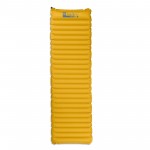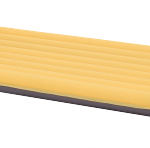I’m a side sleeper. One who prefers to curl my legs way up into an almost fetal position when I’m sleeping.
The other night while testing out my Tour Divide sleep setup, I woke up several times with pain in my bottom knee when sleeping on my side. It occurred when sleeping on either side so it was somehow related to my sleep position. This pain has happened in the past when camping, but never to this extent.
Questions
- Was it due to me trying out a sleeping bag for the first time in several years instead of using my quilt?
- Was it due to the colder temps and somehow curling up differently when sleeping?
- Was it due to the mummy shape of the sleeping pad?
- Am I just getting older and a thinner pad doesn’t work as well?
- Is there an issue with the vertical baffles of my pad versus the horizontal design of other pads?
It was time for some research and testing.
It Must Be The Thickness
Initially, I thought the thickness of the pad was causing my pain. My current pad is a Kooka Bay 3/4 length inflatable mummy pad that I’ve had for about 5 years. The pad is 1.75″ thick which doesn’t allow for much adjustment in softness by removing a bit of air. Remove too much air and you’re hips and shoulders are touching the ground.
After pulling out a thicker Big Agnes mummy pad, I was able to rule out thickness as the issue. Yes, the thicker pad was a more plush feeling pad, but my knee pain was still present.
I realized that when I curled my legs up when side sleeping, my knees would end up off of the pad by a couple of inches. Being in that position for a couple of hours of sleep must have been putting extra pressure on the bottom knee and twisting/tweaking it just enough to cause the pain.
Both of the mummy shaped pads begin tapering just past the hip area. If they were rectangular, then my knees would not end up off of the pad. Time for another test.
Nope, It Must Be The Shape
I went to the way back gear machine and pulled out my rectangular Therm-a-rest from my college days. This test was successful, and I’m able to curl up and still keep my knees on the pad. Success! Full fetal position is not possible without having my knees off of the pad. The result was enough to convince me to look at rectangle pads.
Now the question turned to which rectangle pad? My criteria were a full length pad weighing less than 1 pound.
Which Pad To Choose?
With my requirements in hand, I did what any good gear geek does – fire up “the Google” and open lots of browser tabs. Gossamer Gear has some new lightweight pads, but the longest one is 56″ so it doesn’t make the cut. Big Agnes has a bunch of options with one of those being a new 4″ thick pad. That’s practically a mattress and is that really camping? 🙂 The Therm-a-rest pads are lightweight and full length, but they have a taper which I’m trying to avoid.
In the end, I settled on 4 options.
| Pad Details | Pros | Cons | |
|---|---|---|---|
 | Klymit Inertia O Zone 21.5"W x 72"L x 1.75" D 12.2 oz | Widest pad Integrated pillow Side rail baffles | May sleep colder Thinnest pad |
 | Nemo AstroAir Lite 20R 20"W x 72"L x 3"D 14 oz | Lighest full pad Elevated head section | Do horizontal baffles work better? No side rail baffles |
 | Big Agnes Air Core SL 20"W x 72"L x 2.75"D 17 oz | Thickest pad Interesting baffling design | Heaviest pad but still lightweight No side rail baffles |
 | Exped SynMat UL 7 M 20"W x 72"L x 2.75D 16oz | Only insulated pad Side rail baffles | Is an insulated pad required? |
Based on this information, I’m actually leaning towards the Klymit pad. Although it gets the “funky looks” award, I’m intrigued by the integrated pillow (no need to carry a separate pillow) and it’s extra 1.5″ of width for my knees. My only concern is if it sleeps a lot colder than other non-insulated pads, especially when using a quilt.
So, I’m wondering if any other side sleepers have gone through a similar experiment?
Does anyone have experience with the Klymit pad?
Which of the four would you choose?
